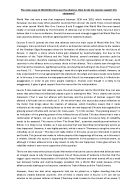Were the alliances of WWI more likely to cause or to prevent war?
Alliances linked nations (groups of people) together from the first tribal wars on. In the early parts of the second millennium, nations were commonly linked through marriage or relation of their leaders. This usually linked two or three nation, but never were entire continents divided into two camps of allies. This allying didn’t come about until the 19th and 20th centuries, with the coming to power of the Central powers and the Allies of WWI. But were these alliances that divided a continent and drew intercontinental players more likely to have causes the hell of WWI, or to have prevented it? This question will be answered through an investigation of the alliances of from the time after the Franco Prussian war of 1870 to the outbreak of WWI. A concluding paragraph will answer the question at hand.
In 1870, France, under Napoleon the 3rd, declared war on newly united Germany, under Kaiser Wilhelm the 2nd, and the military council of Otto von Bismarck. The French were defeated, and took back most of the southern German states. This is when the alliances started. Germany knew that the defeat of France left them bitter and humiliated, and that they would strike back the first opportunity they had. Bismarck enforced a foreign policy, after 1871 that would ensure a peace in the newly united state, so that it could be developed. He feared an attack from the east and west, so he tried to keep an alliance with Austria-Hungry and Russia to keep Russia from allying with France. But Russia and Austria-Hungry were rivals for influence in the Balkans, which made it difficult to keep and alliance with both of them. This loose alliance broke up after the conflicts in the Balkans. In 1879, Bismarck established a military alliance with Austria-Hungry. They agreed to go to war if either country were attacked by Russia. Italy soon joined in 1882, creating the Triple Alliance. The members of this new alliance agreed to give aid if two or more countries attacked either of the three. The Emperors League of 1881 was developed between the Russians, Austria-Hungarians and the Germans to say that they would remain neutral if any of them went to war with another country. This eased the conflict in the Balkans between the Russians and the Austria-Hungarians. Bismarck left office in 1890, and Wilhelm instituted a new foreign policy, which worsened relations with other countries. Soon, Russia broke away their ties, and Bismarck’s worst fears came true. Russia and France agreed to mobilize if any of the members of the Triple Alliance were to mobilize. They also agreed to help each other in the case of Germany attacking. Germany, so strong industrially, so confident militarily, resented the close alliance between her western and eastern neighbors, France and Russia. As a counterweight, she clung to her southern neighbor Austria-Hungry, a partner in need, however cumbersome that partner might be. With the realization of a future war on two fronts, the German chief of German General Staff Alfred von Schlieffen developed a plan for that war in 1905. It involved the bulk of the German army sweeping to France to defeat them in a quick manor, with the rest of the German army holding off the slow Russians.







